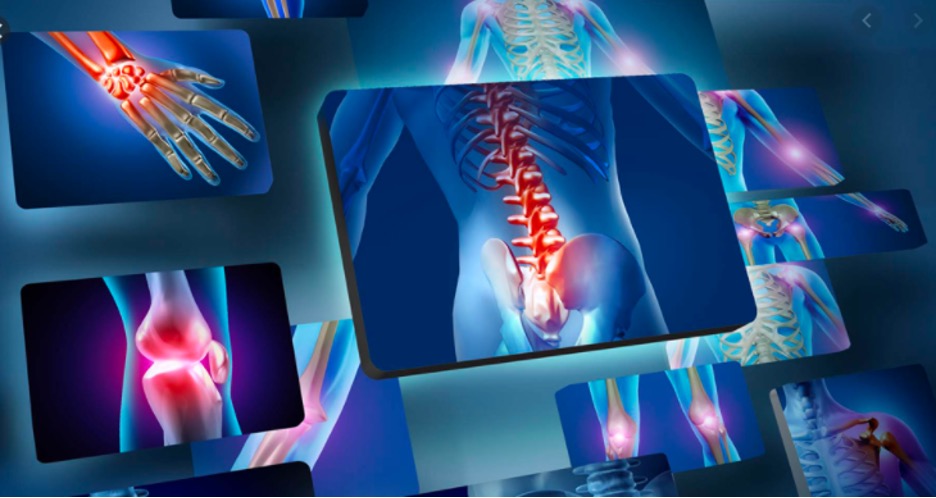If you are experiencing signs your body has inflammation, it can crop up in the form of various symptoms and be a sign of a number of different health concerns. Usually, inflammation is associated with joint health since arthritis is one of the top causes of pain and swelling. But inflammation can be associated with other health concerns, beyond swollen joints.
Keep in mind that not all inflammation is bad. Acute inflammation is important to our health because it helps us heal. Think about when you twist your ankle and it becomes hot, red, and swollen. That is part of your body's response to help heal the injury." And it will go away, once your ankle is healed.
What you want to watch out for are signs of chronic inflammation - This is the type of inflammation that does more harm than good. "Think of chronic inflammation like a fire that needs to be put out in the body. Chronic inflammation has a domino effect where it can trigger a cascade of symptoms that can negatively impact your health."
Here are a few signs you have too much inflammation, according to experts:-
- Chronic Fatigue
Inflammation can be caused by too little sleep, as well as too much sleep. So, if you' are falling short of or exceeding the recommended seven to nine hours of sleep per night, there is a good chance you have inflammation in your body.
But why does it happen? It seems that too little sleep or too much sleep throws the body's inflammatory response processes out of whack. As a result, your cells respond with inappropriate inflammation. It is almost as if your body treats inadequate sleep or too much sleep as it would an illness. It is as if it thinks it is sick and reacts accordingly. Since the body’s immune system cannot fight off the inflammation, the body and brain become overtaxed, resulting in chronic fatigue.
Fatigue can also be a side effect of other inflammatory issues, so if you have been feeling exhausted — despite getting enough sleep each night — seek help immediately.
- Swollen Joints and Muscle Aches
Swollen or painful joints are a common symptom of arthritis. Most people feel pain in the hands, wrists, feet, ankles, and knees. Aside from arthritis and other disorders of the joints, chronic inflammation can also cause sore muscles. Autoimmune disorders such as lupus can result in muscle aches as well.
Experiencing pain on a regular basis is a big indicator of inflammation. If you are not in pain but have pain at the end of your range of motion (like rotating your shoulders back or touching your toes), that is associated with inflammation. Pain like this could be a sign that you have a type of arthritis, which is a major contributor to inflammation and pain in the body.
- Stomach Problems
If you have chronic stomach problems such as IBS or Crohn’s, you might have chronic inflammation. Inflammation in the gut can cause bloating, loose stools, urgency, and cramping. These symptoms can occur due to stress, diet, or other lifestyle factors which results in the stomach lining losing some of its protective cells.
Drinking too much alcohol and taking pain relievers regularly can also cause chronic stomach problems.
- Brain Fog/Issues
Believe it or not, inflammation can even start to affect you mentally, on top of all the ways it can impact you physically. “Brain fog” refers to a few symptoms such as lethargy, difficulty concentrating, poor memory, slower thinking, and inability to think clearly, which can cause cognitive impairment. A study published in the journal Frontiers in Neuroscience said that inflammation of the brain might cause brain fog. Early findings suggest that inflammation may contribute to Alzheimer’s disease and other conditions that cause dementia.
- Skin Problems
Basically, if there is something showing on the outside or something that isn't feeling right on the inside, there is most likely inflammation, because internal inflammation can show up externally. Our skin is the most obvious place to spot swelling or similar reactions, yet we overlook our largest organ far too often. Inflammation can show up on the skin in the form of athlete’s foot, dry skin, eczema, psoriasis, and ringworm. Skin disorders can also point to an autoimmune disorder or allergic reaction.
- Swollen Lymph Nodes
Lymph nodes, which are primarily located in your neck, under the armpits, and near the groin, can swell up whenever something is amiss in your body, so it is important to pay attention to them. Lymph nodes are 'hubs' for the immune system. Your lymph nodes will swell as your body fights off the infection, and then go back down once you are well again. If your lymph nodes are always inflamed, however, or if they hurt, it could be a sign of a chronic illness or other underlying issue.
- Heartburn
Studies have shown that gastroesophageal reflux disease (GERD), which was thought to cause painful heartburn due to stomach acids traveling up the esophagus, may actually be more related to inflammation. According to the study, published in the Journal of the American Medical Association, it may be the body's inflammatory response that is causing pain and damage to the esophagus.
- Headaches/Migraines
With migraine and headache sufferers, they can be affected by what is called 'neurogenic inflammation’. A neurologic examination should be performed on patients who are having recent onset of new headaches/migraines or changes in previous headaches/migraines to rule out any underlying disease. But again, many times inflammation can be lowered, and symptoms relieved, by making a few small changes. "Stress, tobacco smoking, and alcohol use can stimulate the inflammatory response and cause migraines and headaches.
- Depression
Recent studies have shown that depression and chronic inflammation may have more in common than we think. Brain scans of people with depression show more inflammation than people who do not have depression. One study even found that 46% of people with depression had higher levels of C-reactive proteins – an inflammatory marker – in their blood.
- Visceral Fat
The Washington University School of Medicine found that fat accumulation around the organs – also known as visceral fat – results in inflammation. In 2007, a team of researchers published a study in the journal Diabetes and discovered that visceral fat results in systemic inflammation and insulin resistance. Insulin resistance can lead to high blood sugar. That can damage your nerves and blood vessels. It could also lead to diabetes.
- Muscle Weakness
Sometimes your immune system mistakenly attacks and inflames your muscles (also known as myositis). This could start to break down muscle fiber and make you weaker. It usually happens slowly, most often in your torso, shoulders, and hips. In some cases, you might find it hard to do simple things like walk, bathe, and swallow.
- Lower Back Pain
In ankylosing spondylitis, chronic inflammation typically attacks the spine. Sometimes, it hits your hips, neck, knees, or chest. You might have pain and stiffness in your lower back, especially in the morning. In serious cases, you could have loss of motion.
- Diarrhea
Inflammatory bowel disease, or IBD, has two main forms: ulcerative colitis and Crohn’s disease. In both cases, your immune system overreacts and inflames your colon and small intestine. Diarrhea is one thing that can happen. Others are nausea, joint pain, fever, and skin rashes.
- Hardening of the Arteries (Arteriosclerosis)
If you are gaining body fat or you spend a lot of time taking in foreign substances like cigarette smoke, your body will respond with inflammation. This can cause fatty plaque to build up on the inside walls of your arteries. Known as arteriosclerosis, it is the main cause of heart attack and stroke.
- Blood Clotting
Inflammation from trauma, surgery, or diseases like antiphospholipid syndrome and IBD can cause your blood to clot too much (called hypercoagulation). This might cause swelling and could bring on more serious things like stroke, heart attack, or pulmonary embolism. It is not always easy to spot hypercoagulation though.
- Dry Eye
It is a common symptom of inflammation. One condition, Sjogren’s syndrome, affects your salivary glands and your tear glands. You might notice a gritty or burning feeling in your eyes, swelling in your salivary gland, and dryness in your nose and throat.
Let’s look at the Foods That Reduce Inflammation in the next blog.
Learn more how Hi-Bliss Hydrogen Therapy can help reduce Inflammation here : https://wordpress-851564-2937612.cloudwaysapps.com/what-is-hibliss-hydrogen-therapy/
Sources:
- https://www.powerofpositivity.com/7-signs-you-have-inflammation/
- https://www.webmd.com/arthritis/ss/slideshow-signs-chronic-inflammation-unexpected https://www.powerofpositivity.com/7-signs-you-have-inflammation/



